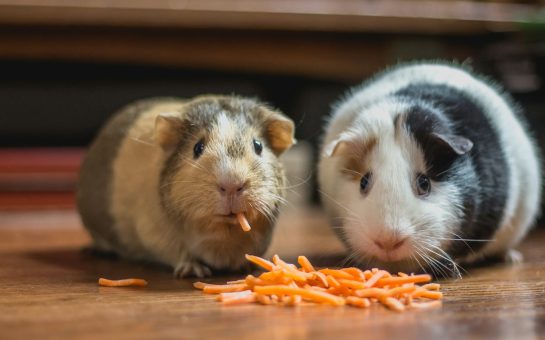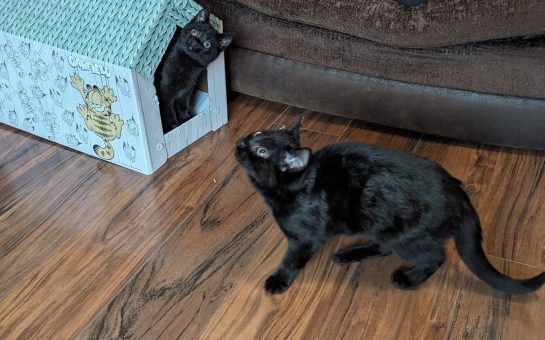A former scientific researcher at Manchester University has been fined £2,493 for killing his nextdoor neighbour’s cat after it ate a cocktail of poison he left out for rats.
Dr Colin Whitehurst, 54, was so fed up with rodents prowling his two acre garden he mixed bacon, tuna and slug pellets together and set a trap to kill them off.
But the inventor, who patented medical lighting equipment to treat hospital patients, ended up causing silver tabby Tallulah to die an agonising death.
The 18-month-old female, who had recently given birth to a kitten, took a bite of the toxic sandwich which was left on a grey roofing slate which had been propped up against a tree.
Moments later she was found dying with foam and bubbles coming from her nose and mouth and with her back arched.
When her owner David Furness, 41, a professional dog breeder and kennel owner made further inquiries he found the poisoned food on the boundary he shares with Whitehurst in the village of Little Bollington, Cheshire.
The businessman spoke of his ‘devastation’ and anger after Whitehurst escaped jail after pleading guilty to causing unnecessary suffering.
The scientist was given a 12 month conditional discharge and must pay the costs after it was said he showed a ‘disregard for wildlife’.
Mr Furness who runs a kennels and breeding firm said: “We were devastated about Tallulah. She was only 18-months-old and what happened to her was terrible and now we are left with just her kitten. She was a lovely cat with a lovely nature.
“The chap would openly say to me he didn’t want any wildlife living in the area – but what I can’t understand was why he then bought a property with all that land.
“If you move to the country this is what you are going to get. He is quite in his rights to kill rats in a contained way but where he put the poison was near the public right of way. A child could have picked it up and plenty of families walk through there.
“It just seems a shabby, dirty and cruel trick to do – knowing we have all the animals.
“The sentence for the death of a cat is very lenient – you get more for not having a tax disc.”
Trafford magistrates court was told the incident occurred last November at Whitehurst’s £650,000 detached house next to the Kottage Kennels, which is run by Mr Furness.
A woman was visiting Mr Furness at the kennels to buy a Pekingese dog only to spot Tallulah lying behind a van wheel.
Tests showed the cat had suffered from effects of slug pellets, bait and poison and it had crippled her nervous system.
It emerged the poison had been placed on a roofing slate that had been propped against a tree in order to create a ‘bait station’.
An RSPCA inspector had attended the scene and spoke to Whitehurst who confirmed he had put poison down with the intention of killing rats.
Prosecutor for the RSPCA, Miss Anna McDonald, said: “The cat died as a consequence of poisoning. It was a rapidly acting poison and causes fits often within 30 minutes of ingestion. It is often fatal but can be treated. Death is unpleasant, it causes fitting and hypothermia.
“Placing food on a roofing tile is controversial. Animals will seek it out if they smell the food source. Any animal in the area may have accessed it. The poison should never have been mixed with the food. Any poison should be placed in a container.
“He said he was trying to control a rat problem on his land. The cat would have suffered an unpleasant death and the suffering was unnecessary. Placement showed a disregard to wildlife. Mixing it with food made it attractive to all wildlife in the area.”
In mitigation Whitehurst’s lawyer, Mr Paul Fitton, said: “He is extremely remorseful he hasn’t done this before or since. He is not an animal hater nor should he be classified as one.”
“Historically there have been problems with rats on the land. The nextdoor property which keeps dogs has kennels made from stables and rats have been on the border of this land.
“The last time he recalls putting rat poison down is in the winter and spring in 2009/2010. On that occasion he did not use any food to bait the rat poison.
“On this occasion he saw a dead rat and made the decision to put rat poison down and bought it from off-the-shelf like you can get in stores such as B and Q.
“The property is quite secluded there are no children around and he hadn’t seen much wildlife that live on the ground in that area at that time. There was no intention to harm any animal, he was naive to bait the poison with leftovers.”
Chairman Margaret Sturt told Whitehurst: “A cat has died under distressing circumstances but we also understand there was no intention to cause harm to any animals apart from killing rats.”
Story via Cavendish Press
Image via Daniel Lobo, with thanks



